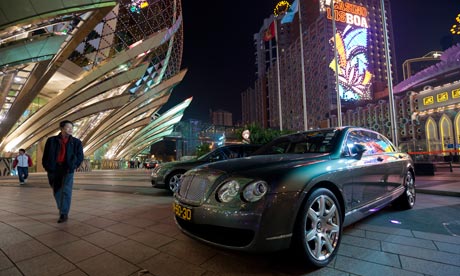
The luxury carmaker Bentleyhas defied the economic gloom with a 37% surge in global sales, while European stock markets rallied after fresh data showed manufacturing is doing slightly better than expected.
Investors were heartened by figures showing global manufacturing activity had not collapsed, as some feared. In Britain, the sector contracted less in December than in recent months, according to the purchasing managers' index (PMI), while a keenly watched survey in China showed an increase in manufacturing activity, sending share prices higher around the world.
But Bentley took analysts by surprise on Tuesday with a sparkling set of figures for 2011, powered by rising sales to China and the United States. It has forecast strong growth this year.
British-based car firms such as Bentley have provided glimmers of light for hard-pressed manufacturers. Toyota said in November that it planned to create 1,500 UK jobs as part of a £100m investment to build a new family car at its factory in Derbyshire. And Jaguar Landrover is planning to double the size of its Merseyside plant, adding more than 1,000 positions.
Bentley's boss, Wolfgang Dürheimer, said his firm's performance was down to the growing allure of its models, particularly the new Continental GT, priced from £136,000, which accounted for more than a third of sales. He acknowledged this year would be tough, but said he still expected sales growth to be in double figures.
The recent launch of Bentley's new soft-top Continental GTC has been a big hit, and boosted December sales by 69% on the same month in 2010. The Bentley Mulsanne, described as the company's "flagship" model, which costs nearly £226,000, is also selling well, said Dürheimer.
Bentley, owned by the German car group Volkswagen (VW), is based in Britain where it employs 4,000 people in Crewe and is viewed as one of the most successful Anglo-German business ventures.
One analyst said: "It's a partnership and it works fantastically well – very different from the disastrous association between Rover and BMW."
Dürheimer said: "The dramatic sales growth reflects the global strength of the brand, and a recognition of the quality, craftsmanship and engineering excellence of our cars."
Bentley employs about 800 British engineers and has launched a campaign in British schools to attract more people to auto engineering at a time when there are international skills shortages.
Sales at the group bounced back to pre-recession levels during 2011, with strong growth in leading markets. The 37% global rise equates to more than 7,000 vehicle sales.
The US continues to be Bentley's biggest market with 2,021 cars sold last year, an increase of 32%. China took second spot with sales doubling to 1,839 and surpassing the previous year's record before the end of July.
"This achievement is even more remarkable considering Bentley has been present in China for less than ten years," said Dürheimer.
One of the weakest spots for Bentley has been the UK, which was described as "extremely challenging" – but even here the company managed a 5% increase, selling 1,031 cars.
Dürheimer is hopeful of continuing success in 2102, saying the new Continental V8 should attract new customers: "[We have] realistic plans which reflect global economic conditions."
But Bentley's sales figures are still a third down on the peak in 2007 when it sold more than 10,000 vehicles; and no one is predicting they will return to those levels anytime soon.
Elsewhere, Philip Shaw, an economist at Investec, said he welcomed the improvements disclosed in the PMI survey, which asks manufacturers about their output and order books.
The December reading of 49.6 was up from the 47.7 recorded in November, but still below the 50 mark that signals expansion.
Shaw said the data was good news but added: "It seems to be due to firms eating into backlogs of work to keep output up, in which case the sector remains vulnerable to a sharper downturn over the coming months. Our central view is that the economy as a whole will experience a short recession."
Rob Dobson, senior economist at Markit, said: "December brought some brighter news for UK manufacturers", noting that export orders were up, output appeared to have stabilised, and fewer layoffs were being reported than in November.
"However, over the fourth quarter as a whole, producers reported their worst performance since the second quarter of 2009. Manufacturing will therefore likely be a drag on the economy in the closing months of the year."
With the eurozone crisis far from over, and manufacturers still heavily dependent on Britain's traditional markets across the Channel, many firms will be watching closely to assess whether the downturn in Europe is hitting orders. David Cameron used his new year message to warn that the UK economy cannot be isolated from events in the eurozone.
Lee Hopley, chief economist at the Engineering Employers' Federation, which represents manufacturers, described the survey as "a mixed bag".
"The overall indicator may suggest another month of contraction across the sector, but there are some positive points to take away," she said. "Some sectors within manufacturing are still growing relatively strongly, confirming the dual-speed recovery seen in the official statistics in recent months.
"This growth in orders and production has been bolstered by an improvement in export demand, which we'll need to see continue in the coming months to prop up growth across the wider economy."

